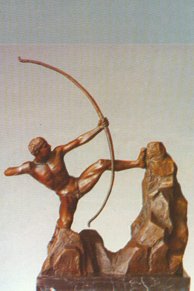Vrihimukha, Vrihi-mukha, Vrīhimukha: 4 definitions
Introduction:
Vrihimukha means something in Hinduism, Sanskrit. If you want to know the exact meaning, history, etymology or English translation of this term then check out the descriptions on this page. Add your comment or reference to a book if you want to contribute to this summary article.
In Hinduism
Dhanurveda (science of warfare)
Source: Wisdom Library: DhanurvedaVrihimukha (व्रिहिमुख) refers to a mythical weapon. It is a Sanskrit word defined in the Dhanurveda-saṃhitā, which contains a list of no less than 117 weapons. The Dhanurveda-saṃhitā is said to have been composed by the sage Vasiṣṭha, who in turn transmitted it trough a tradition of sages, which can eventually be traced to Śiva and Brahmā.

Dhanurveda (धनुर्वेद) refers to the “knowledge of warfare” and, as an upaveda, is associated with the Ṛgveda. It contains instructions on warfare, archery and ancient Indian martial arts, dating back to the 2nd-3rd millennium BCE.
Languages of India and abroad
Sanskrit dictionary
Source: DDSA: The practical Sanskrit-English dictionaryVrīhimukha (व्रीहिमुख).—a surgical instrument (resembling a grain of rice).
Derivable forms: vrīhimukhaḥ (व्रीहिमुखः).
Vrīhimukha is a Sanskrit compound consisting of the terms vrīhi and mukha (मुख).
Source: Cologne Digital Sanskrit Dictionaries: Monier-Williams Sanskrit-English DictionaryVrīhimukha (व्रीहिमुख):—[=vrīhi-mukha] [from vrīhi] mfn. (a surgical instrument) which resembles a grain of rice, [Suśruta]
[Sanskrit to German]
Sanskrit, also spelled संस्कृतम् (saṃskṛtam), is an ancient language of India commonly seen as the grandmother of the Indo-European language family (even English!). Closely allied with Prakrit and Pali, Sanskrit is more exhaustive in both grammar and terms and has the most extensive collection of literature in the world, greatly surpassing its sister-languages Greek and Latin.
See also (Relevant definitions)
Partial matches: Mukha, Vrihi.
Query error!
Relevant text
Search found 8 books and stories containing Vrihimukha, Vrihi-mukha, Vrīhi-mukha, Vrīhimukha; (plurals include: Vrihimukhas, mukhas, Vrīhimukhas). You can also click to the full overview containing English textual excerpts. Below are direct links for the most relevant articles:
Surgery in ancient India (Study) (by P. P. Prathapan)
2. Surgical Instruments mentioned in Sushruta Samhita < [Chapter 5 - Surgical instruments in Sushruta Samhita]
8. Application of the Nadi Yantras < [Chapter 5 - Surgical instruments in Sushruta Samhita]
3. Handling of Instruments according to Sushruta < [Chapter 5 - Surgical instruments in Sushruta Samhita]
Sushruta Samhita, volume 1: Sutrasthana (by Kaviraj Kunja Lal Bhishagratna)
International Ayurvedic Medical Journal
A comparative clinical study on the effectiveness of udvartana with siravyadha in the management of sirajagranthi (varicose vein) < [2020, Issue 11, November]
Importance of raktamokshana in blood-purification < [2020, Issue 3, March]
Literary research on adho shakhagat vedhya sira < [2018, Issue II, february,]
World Journal of Pharmaceutical Research
Siravydha Vidhi: Indications, Procedure, Precautions, and Benefits < [2020: Volume 9, September special issue 11]
A review on raktamokshana by siravyadha in mukhagata rogas < [2023: Volume 12, April issue 5]
An approach of acharya sushrut on abdominal surgeries < [2020: Volume 9, October special issue 13]
Sushruta Samhita, volume 3: Sharirasthana (by Kaviraj Kunja Lal Bhishagratna)
Sushruta Samhita, volume 4: Cikitsasthana (by Kaviraj Kunja Lal Bhishagratna)